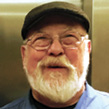EDITOR'S NOTES
That Which Does Not Kill Us Makes Us Stronger
by Dick Kaser
The title of this column is lifted from Nietzsche. His philosophical notion that periods of strife give us strength is a sentiment that rings true through all of the first-person accounts in this edition, which, taken together, provide a snapshot of where libraries of all kinds found themselves at the end of 2020. And it was certainly not where they had begun the year. Still, hope springs eternal in these writings, and most authors conclude that when it’s all said and done, we will be stronger for having had to adapt in order to survive.
Suzanne LaPierre (Fairfax County Public Library) reviews efforts by galleries, libraries, archives, and museums to engage their communities in participatory archiving projects aimed at documenting the human experience during quarantine.
David Lee King (Topeka and Shawnee County Public Library) shares his take on what his library endured during the pandemic in the context of 10 positive lessons learned.
Our standing columnists Terence Huwe and Jan Zastrow have each devoted their columns this issue to a consideration of what the new normal will ultimately look like for academic libraries and archives, respectively.
And Michael Sauers and Kristina Jonker of Do Space discuss the new normal in makerspaces, giving you tips for keeping your high-touch areas clean and hands-on activities safe.
While her work predates COVID-19, Janet Wile (Central Unified School District) tells us how her district joined forces with the local public library to greatly increase the number of ebooks available to students, who often became unwitting online distance learners in 2020.
Kaci Resau (Washington and Lee University) follows up the report she filed here in October about her efforts to keep usability testing going via remote tests using static images and heat maps. This time, she used Zoom to see if she could get better results by making the remote testing experience more authentic.
2020 was a year when librarians had to question their assumptions, adapt, and innovate, which is certainly not a bad thing. Alas, it’s not over yet.
Focus on finding the silver linings, hang in there, and head toward the light.
Dick Kaser, Executive Editor
kaser@infotoday.com

|